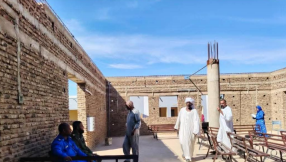The United Church of Christ's general synod voted yesterday to divest from companies that have "been found to profit from the occupation of the Palestinian territories by the state of Israel." Two other mainline Churches are deciding on similar resolutions this week.
Companies mentioned in the UCC's resolution include Caterpillar Inc, Motorola Solutions, Hewlett-Packard, G4S and Veolia. The resolution also calls for boycotting Israeli goods made in the occupied territories.
The synod, which represents the Church's 1.1 million members, passed the resolution with 508 in favour, 124 against, and 38 abstentions. However, a second resolution, which described Israel's actions in the occupied territories as acts of "apartheid" failed to gain the two-thirds majority needed, but received 312 votes in favour, 295 against and 31 abstentions.
The Episcopal Church was also due to decide on its resolution about divestment on Tuesday evening at its general convention in Salt Lake City and it is thought that the Mennonite Church will vote on the issue tonight.
"In approving this resolution, the UCC has demonstrated its commitment to justice and equality," said Rev Mitri Raheb, a Palestinian Christian and pastor of the Evangelical Lutheran Church in Jordan and the Holy Land, who travelled to Cleveland for the synod.
"For Palestinians living under occupation or facing systematic discrimination as citizens of Israel, enduring the destruction of their homes and businesses, the theft of their land for settlements, and living under blockade and siege in Gaza, this action sends a strong signal that they are not alone, and that there are churches who still dare to speak truth to power and stand with the oppressed."
Before the UCC's vote, Archbishop Desmond Tutu wrote to support the resolution. "It is unconscionable to remain silent, or neutral, in the face of injustice. Neutrality maintains the status quo and compounds the injustice," he wrote. He has also supported the move from the Episcopal Church.
Although there may be a flurry resolutions this week, the groundwork has taken place over a number of years. Archbishop Tutu is been among those who have called for divestment from Israel since 2002. The global movement for a campaign of boycott, divestment and sanctions (BDS) was launched by Palestinian civil society groups in 2005.
The UCC also passed a resolution in 2005 to use its "economic leverage" to combat human rights abuses against Palestinians – though this focused more on the reallocation of foreign aid. In 2009 a group of Palestinian Christians released the controversial but influential "Kairos Palestine document" which was a call to Christians to fight Israeli occupation and, among other things, called for divestment.
Last year the Presbyterian Church USA general assembly narrowly voted to divest from Caterpillar, Hewlett-Packard and Motorola Solutions. But the resolution also said that it should not be "construed...as divestment from the State of Israel, or an alignment with or endorsement of the global BDS movement." The United Methodist Church's pension board sold its stock from security company G4S, though Methodists voted against church-wide divestment at their convention in 2012. The UCC's resolution is broader than these previous measures.
The Israeli government considers the BDS movement an attempt to delegitimise the state of Israel. Responding to the UCC's decision, the Israeli Foreign Ministry said that decision was "immoral", adding that: "People of faith and religion should work to facilitate peace and not try to hurt the side [Israel] aspiring for peace."
International pro-Israel group StandWithUs strongly condemned the decision, describing the campaigners supporting the resolution as "extremists pushing a twisted and bigoted theology - one which rejects the history of the Jewish people in Israel and denies them the right to self-determination in their homeland."
They added that the resolution was passed on the basis of "misinformation, outright lies, and a morally corrupt approach which treats Palestinian leaders as blameless in the conflict."
However Jewish Voice for Peace welcomed the decision. Board member Lev Hirschhorn said he was "honoured" to be present for the vote. "Progressives are speaking up, and it's only a matter of time until Israel is held accountable for its human rights abuses and violations of international law," he said.
Jeremy Moodey, CEO of Embrace the Middle East told Christian Today that the BDS movement could be effective, particularly given that there seems to be "increasing concern from Israel" about sanctions.
"I think we're in the last chance saloon," added Moodey. "Something needs to happen, and if Christians can't respond to injustice in this nonviolent, creative way – what would you have us do? I haven't got an alternative."
Although the move to divest has gained significant support in some American churches, it has also been opposed by large sections of the Church, and those who do support it are often described as anti-Semitic.
Rev Chuck Currie, a United Church of Christ minister and chaplain at Pacific University, wrote in the Huffington Post before the vote that the resolutions would not advance the cause of peace, but that it was "unfair" to say they were anti-Semitic.
Responding to the decision by the Presbyterian Church last year, some Baptist leaders were concerned that it would be damaging to Christian mission to Jews. And Jim Sibley, former director of the Pasche Institute for Jewish Studies at Criswell College described the decision as "tragic", adding that "Israel is dear to the heart of God."
But in giving his support for the UCC's motion, Archbishop Tutu said: "Calling me anti-Semitic will not stop me from speaking out for justice... We do not seek to demonize the architects of Israel's occupation of Palestine, but to implore those with the political power to change their policies and their ways. Injustice brutalizes the humanity of the oppressors as well as that of the oppressed. Freedom for Palestinians will liberate Israelis, too."
This article has been amended. Rev Chuck Currie was wrongly quoted in an earlier version. Apologies for this error.













